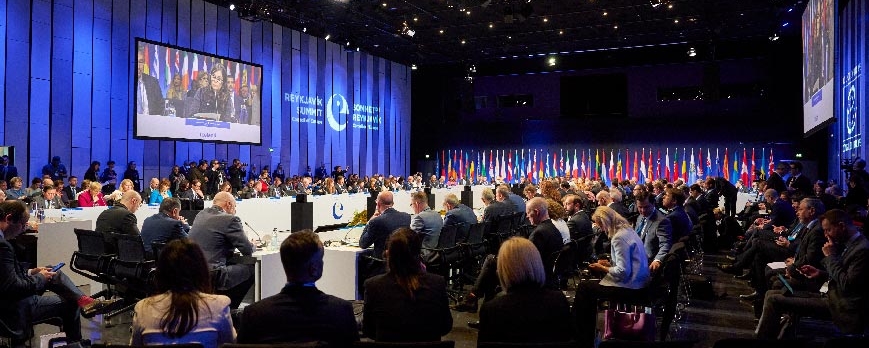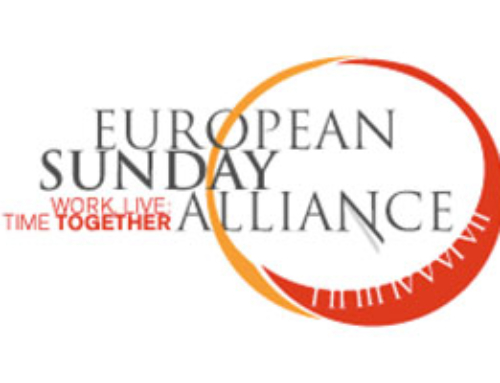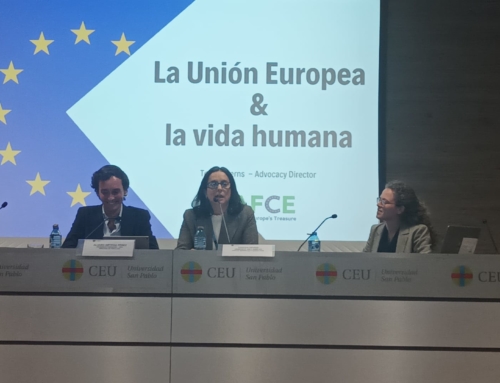23rd of June 2023,
The Council of Europe organised last May its 4th Summit of Heads of State and Government in Reykjavik, Iceland. This Summit aimed “to stand united against Russia’s war of aggression against Ukraine and to give further priority and direction to the Council of Europe’s work”. It was also an occasion for civil society to contribute to the future of democracy and human rights in Europe, to which FAFCE participated.
Our Federation called to invest in the family for Europe’s demographic future: “We cannot think about digital or ecological transitions, or even the promotion of human rights in Europe without a next generation to meet these challenges. This is simply about the human future of Europe”. Our Federation emphasised the key role of family associations as partners in the development of ambitious public family policies, of stronger democracies and of peaceful societies.
After gathering for two days in Iceland, Heads of State and Government adopted a Declaration, the “Reykjavik Declaration: United around our values”. As the 75th anniversary of the Council of Europe is approaching, they exchanged on the future of the organisation, with the burning context of the war in Ukraine.
The Declaration emphasized the importance of the human dignity as cornerstone of human rights: “Dignity and equality are the foundation of modern European societies. We acknowledge the need to ensure equality and combat any kind of discrimination, as well as the important role the Organisation plays in this regard. We therefore commit to strengthening work towards inclusive societies without marginalisation, exclusion, racism and intolerance”.
In its work to promote Democracy in Europe, the Declaration includes in its Appendix III the “Reykjavík Principles for Democracy”, which give a strong accent given to free elections, anti-corruption and freedom of expression, with a key role given to civil society: “We reaffirm that CIVIL SOCIETY is a prerequisite for a functioning democracy and commit to supporting and maintaining a safe and enabling environment in which civil society, as well as human rights defenders, can operate free from hindrance, insecurity and violence”.
In addition, Head of States and Government reiterated their firm commitment to the Convention system and the judgments of the European Court of Human Rights, which currently sees a deficit of implementation of its decisions.
The Declaration also called to invest in the future and in child education: “As we work to promote the rights of the child, we underline the importance of education to give children and young people the necessary references to grow up embracing our democratic values in culturally diverse societies and take an active part in the protection of our cultural heritage”. This also include the responsibility of States to ensure a safe Internet for all users: “We acknowledge the positive impact and opportunities created by new and emerging digital technologies while recognising the need to mitigate risks of negative consequences of their use on human rights, democracy and the rule of law, including new forms of violence against women and vulnerable groups generated and amplified by modern technologies, and, in this context, we commit to ensuring a leading role for the Council of Europe in developing standards in the digital era to safeguard human rights online and offline, including by finalising, as a priority, the Council of Europe’s Framework Convention on Artificial Intelligence”.
As a direct follow-up of the Declaration, Heads of States and Governments also reaffirmed their “ full commitment to the protection and implementation of social rights as guaranteed by the European Social Charter system. We will consider the organisation of a high-level conference on the European Social Charter, as a step to take further commitments under the Charter where possible.”
FAFCE recalls the role of parents, grandparents, children, families and family associations as actors and engines of democracy and as partners in the respect of human rights in Europe. Our Federation emphasises the need to ensure the protection of human dignity, social rights of parents and their freedom of education for their children.







